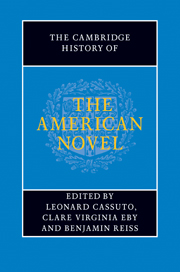Book contents
- Frontmatter
- General Introduction
- PART ONE INVENTING THE AMERICAN NOVEL
- PART TWO REALISM, PROTEST, ACCOMMODATION
- PART THREE MODERNISM AND BEYOND
- Introduction: modernism and beyond
- 37 Stein, Hemingway, and American modernisms
- 38 The Great Gatsby and the 1920s
- 39 Philosophy and the American novel
- 40 Steinbeck and the proletarian novel
- 41 The novel, mass culture, mass media
- 42 Wright, Hurston, and the direction of the African American novel
- 43 Ellison and Baldwin: aesthetics, activism, and the social order
- 44 Religion and the twentieth-century American novel
- 45 Faulkner and the Southern novel
- 46 Law and the American novel
- 47 Twentieth-century publishing and the rise of the paperback
- 48 The novel of crime, mystery, and suspense
- 49 US novels and US wars
- 50 Science fiction
- 51 Female genre fiction in the twentieth century
- 52 Children's novels
- 53 The American novel and the rise of the suburbs
- 54 The Jewish great American novel
- 55 The Beats and the 1960s
- 56 Literary feminisms
- 57 Reimagining genders and sexualities
- PART FOUR CONTEMPORARY FORMATIONS
- A selected bibliography
- Index
57 - Reimagining genders and sexualities
from PART THREE - MODERNISM AND BEYOND
Published online by Cambridge University Press: 28 July 2011
- Frontmatter
- General Introduction
- PART ONE INVENTING THE AMERICAN NOVEL
- PART TWO REALISM, PROTEST, ACCOMMODATION
- PART THREE MODERNISM AND BEYOND
- Introduction: modernism and beyond
- 37 Stein, Hemingway, and American modernisms
- 38 The Great Gatsby and the 1920s
- 39 Philosophy and the American novel
- 40 Steinbeck and the proletarian novel
- 41 The novel, mass culture, mass media
- 42 Wright, Hurston, and the direction of the African American novel
- 43 Ellison and Baldwin: aesthetics, activism, and the social order
- 44 Religion and the twentieth-century American novel
- 45 Faulkner and the Southern novel
- 46 Law and the American novel
- 47 Twentieth-century publishing and the rise of the paperback
- 48 The novel of crime, mystery, and suspense
- 49 US novels and US wars
- 50 Science fiction
- 51 Female genre fiction in the twentieth century
- 52 Children's novels
- 53 The American novel and the rise of the suburbs
- 54 The Jewish great American novel
- 55 The Beats and the 1960s
- 56 Literary feminisms
- 57 Reimagining genders and sexualities
- PART FOUR CONTEMPORARY FORMATIONS
- A selected bibliography
- Index
Summary
From its earliest instances in Anglo-American literature, the novel questioned prevailing gender and sexual norms. Beginning in the eighteenth century, this genre challenged the primacy of the aristocracy, for it figured the rising middle class and its worldview through the lens of virtuous womanhood. In novels such as Pamela (1740) and Clarissa (1748), pious female servants resisted rapacious lords, and bourgeois marriages of true minds overcame the power-consolidating arrangements of upper-class families. Feelings trumped force; housewifery trumped high birth. As a literary form, then, the novel was already radical in the way it reconceived power relations with feminine subjectivity at the core. But it was also what we might now call conservative in its championing of consensual heterosexual relations as the supreme achievement of social being. In later years, women and gay men wishing to write beyond the conventionally heterosexual ending therefore had to retool the bourgeois domestic novel.
This work was well underway by the mid nineteenth century, at least in Anglo-US writing, so that later writers already had a novelistic, sexually experimental tradition to draw upon. The American Renaissance had produced works that challenged the British model and offered new formations of sex and gender, particularly the marital “closure” readers of the novel had come to expect. Hawthorne's The Scarlet Letter (1850) showcased an adulterous heroine; Melville's Moby-Dick (1851) depicted a microcosmic all-male world on a whaling ship; Thoreau's Walden (1854) extolled the virtues of bachelorhood in the wild. The later nineteenth century produced novels of withdrawal from the dominant social world, and these withdrawals were often figured as flights from marriage and family.
- Type
- Chapter
- Information
- The Cambridge History of the American Novel , pp. 941 - 956Publisher: Cambridge University PressPrint publication year: 2011



